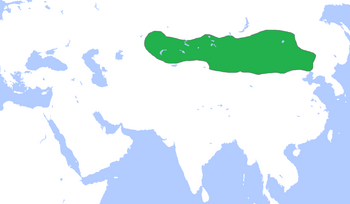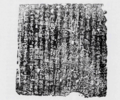Rouran facts for kids
Quick facts for kids
Rouran Khaganate
|
|||||||||||||
|---|---|---|---|---|---|---|---|---|---|---|---|---|---|
| 330–555 | |||||||||||||

Rouran Khaganate in Central Asia
|
|||||||||||||
| Status | Khanate | ||||||||||||
| Capital | Mumo city, Orkhon River, Mongolia | ||||||||||||
| Common languages | Ruanruan Mongolian Chinese |
||||||||||||
| Religion | Tengrism Shamanism Buddhism |
||||||||||||
| Khagan | |||||||||||||
|
• 330
|
Yùjiǔlǘ Mùgǔlǘ | ||||||||||||
|
• 555
|
Yujiulü Dengshuzi | ||||||||||||
| Legislature | Kurultai | ||||||||||||
| History | |||||||||||||
|
• Established
|
330 | ||||||||||||
|
• Disestablished
|
555 | ||||||||||||
| Area | |||||||||||||
| 405 | 2,800,000 km2 (1,100,000 sq mi) | ||||||||||||
|
|||||||||||||
| Today part of | China Kazakhstan Mongolia Russia |
||||||||||||
| Rouran | |||||||||
|---|---|---|---|---|---|---|---|---|---|
| Chinese | 柔然 | ||||||||
|
|||||||||
| Ruru | |||||||||
| Traditional Chinese | 蠕蠕 | ||||||||
| Simplified Chinese | 茹茹 | ||||||||
|
|||||||||
| Tantan | |||||||||
| Chinese | 檀檀 | ||||||||
|
|||||||||
The Rouran (Chinese: 柔然; pinyin: Róurán) were a powerful group of people who ruled parts of northern China a long time ago. This was during a period called the Sixteen Kingdoms.
Historians think they might have been early Mongols or Turkic peoples. They spoke a language called Ruanruan.
The Rouran came from a group called the Xianbei. They were the first to use the important titles "khan" or "khagan" for their leaders. The Rouran Khaganate was their empire, which lasted from the 4th to the 6th centuries.
Later, another group called the Göktürks defeated them. This led to the rise of the Turkic peoples in the region. Some Rouran people might have moved west after their defeat. They may have become part of the Pannonian Avars.
Contents
Where Did the Rouran Live?
The Rouran were nomads, meaning they moved around a lot. They lived in the eastern Eurasian Steppe. This area includes modern-day Mongolia and northeast China.
They took control of this land after the Xianbei people moved south. One historian, Kwok Kin Poon, believes the Rouran came from a branch of the Xianbei called the Donghu Xianbei.
The Rouran Story
The Rouran Khaganate was started by a leader named Yujiulu Shelun. His family had been slaves of the Xianbei people. The Xianbei used the word "rouran" to mean "wriggling worms."
After the Xianbei moved south in the 3rd century, the Rouran grew strong. They conquered a lot of land.
In 402, Shelun brought all the Rouran together. They defeated their neighbors, the Tiele, and expanded their control. They even reached the important Silk Road trade routes. They also conquered the Hephthalites, a group from Central Asia, and made them their vassals (meaning the Hephthalites had to obey the Rouran).
The Hephthalites later moved towards India. They adopted many Rouran customs and words, including the title "Khan."
In 429, a Chinese kingdom called Northern Wei attacked the Rouran. Many Rouran people were killed.
In 434, the Rouran and Northern Wei made a special peace agreement. This was called a heqin, which often involved a marriage between royal families.
Between 440 and 460, the Northern Wei attacked the Rouran several more times. They defeated the Rouran in many battles.
The Rouran also made a heqin agreement with a Han-Chinese ruler named Gao Huan. He was the ruler of the Eastern Wei kingdom.
In 508, the Tiele people defeated the Rouran in a battle. However, the Rouran fought back. In 516, the Rouran defeated the Tiele.
The Fall of the Rouran
In 551, a leader named Bumin of the Ashina Göktürks helped the Rouran. He defeated a Tiele rebellion for them. In return, Bumin asked to marry a Rouran princess. This was a way to form a strong alliance.
But the Rouran leaders refused his request. So, Bumin declared his independence from the Rouran.
Bumin then made a heqin agreement with the Western Wei kingdom. This kingdom had descended from the Northern Wei. Bumin then attacked the Rouran in 552. He killed their leader, Yujiulü Anagui. Bumin also conquered a very important place called Otuken.
Bumin declared himself Illig Khagan. This marked the beginning of the Turkic Khaganate. Bumin died soon after, but his son Issik Qaghan continued the fight. Issik kept attacking the Rouran but died a year later in 553. His brother, Muqan Qaghan, finished the job. He completely defeated the Rouran in 555.
Images for kids
-
A small statue of a guardian warrior from a tomb in Bulgan Province, Mongolia.
-
Northern Wei and Tuyuhun around the year 500.
See also
 In Spanish: Rouran para niños
In Spanish: Rouran para niños
 | Laphonza Butler |
 | Daisy Bates |
 | Elizabeth Piper Ensley |








